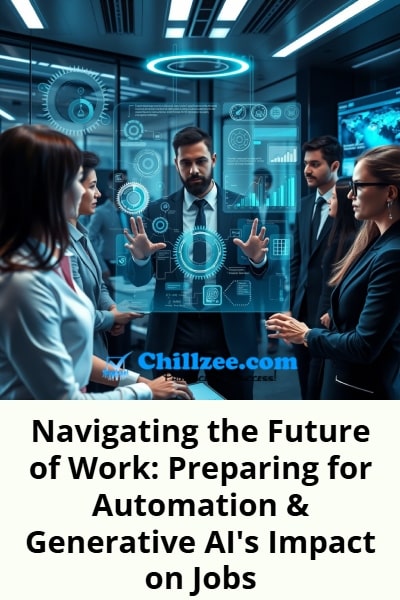Navigating the Future of Work: Preparing for Automation & Generative AI's Impact on Jobs
The rapid pace of technological innovation is reshaping the global workforce at an unprecedented rate. Automation and generative AI are not only transforming how businesses operate—they’re fundamentally changing the nature of work. From routine tasks in manufacturing to creative roles in content creation, many jobs are being redefined or even phased out. In this article, we’ll explore which jobs are most at risk, share real-life examples of industry impacts, and provide actionable strategies to help you prepare and reskill for the future of work.
Automation and Generative AI: What’s Changing?
Automation and generative AI have begun to take over repetitive and data-intensive tasks across various industries. These technologies can process large volumes of data, generate content, and even make decisions based on patterns that were once the exclusive domain of human expertise. As a result, roles that heavily rely on routine operations are at high risk, while new opportunities emerge for those who can harness these technologies.
Real-Life Examples: Jobs Impacted by Automation & Generative AI
Customer Service Representatives: With the advent of AI-powered chatbots and virtual assistants, many companies are automating customer interactions. This not only speeds up response times but also reduces the need for large customer service teams. For example, a major telecom company recently deployed a generative AI system that handles 70% of routine inquiries, allowing human agents to focus on complex cases.
Manufacturing & Production Roles: Automation has been a part of manufacturing for decades, but the integration of generative AI has taken efficiency to a new level. In modern factories, smart robots can now adjust production processes in real time. A well-known automotive manufacturer, for instance, uses AI-driven robots that optimize assembly line operations, resulting in a 25% reduction in production time.
Content Creation & Journalism: Generative AI tools are revolutionizing creative industries. News outlets and content creators are beginning to use AI to draft initial versions of articles, generate reports, or even create visual content. While this may reduce the need for routine writing tasks, it also opens up opportunities for journalists to focus on in-depth investigative reporting and creative storytelling.
Data Entry and Analysis: Roles that involve manual data entry or basic analysis are also being transformed. AI systems can quickly process and analyze data, providing insights that would take humans much longer to generate. Companies in the finance sector, for example, are now leveraging AI to handle large datasets, reducing errors and streamlining decision-making processes.
How to Prepare: Workforce Reskilling Strategies
While the rise of automation and generative AI presents challenges, it also offers numerous opportunities for those willing to adapt. Here are some actionable steps to future-proof your career:
- Invest in Lifelong Learning: Enroll in courses that focus on digital skills, data analytics, and AI. Platforms like Coursera, Udacity, and LinkedIn Learning offer courses tailored to the evolving job market.
- Develop Soft Skills: Skills such as critical thinking, creativity, and emotional intelligence are increasingly valuable. These are areas where humans continue to outperform machines.
- Embrace Cross-Training: Diversify your skill set by learning about different areas of your industry. For instance, a marketing professional could benefit from understanding data analytics or basic coding.
- Stay Informed: Follow industry news and join professional networks to keep up with emerging trends. Subscribing to reputable tech and management publications can help you anticipate changes before they hit your role.
- Experiment with AI Tools: Familiarize yourself with generative AI platforms and automation tools relevant to your field. Hands-on experience is invaluable in understanding how these technologies can augment your work.
Emerging Opportunities in the Future Job Market
Even as some traditional roles evolve or diminish, new opportunities are emerging. Positions such as AI trainers, data ethicists, and digital transformation specialists are in high demand. Companies are actively seeking professionals who can bridge the gap between technology and business strategy. By reskilling and positioning yourself as a versatile worker, you can tap into these emerging markets and secure a competitive advantage.
Conclusion
The impact of automation and generative AI on the job market is both profound and inevitable. However, by understanding which roles are most affected and proactively engaging in reskilling, you can transform these challenges into opportunities. Embrace lifelong learning, refine your skill set, and stay ahead of industry trends to navigate the future of work successfully. Preparing today is the key to thriving in the rapidly evolving job market of tomorrow.
